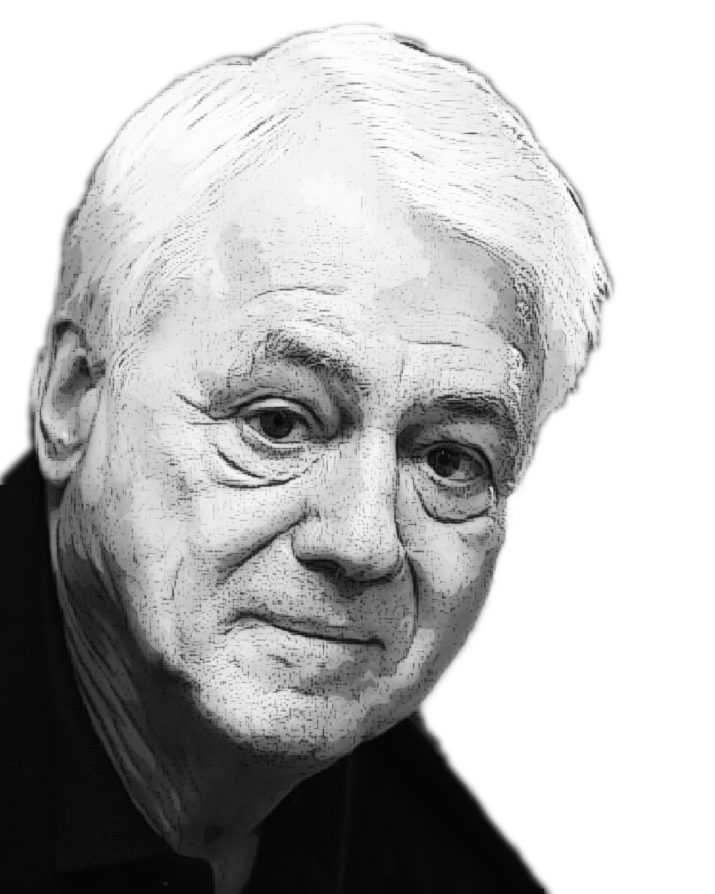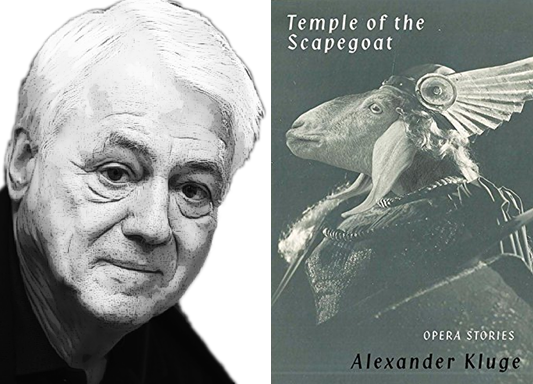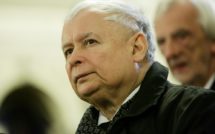

Translated from the German by Isabel Fargo Cole and Martin Chalmers
This is part of our special feature on Nationalism, Nativism, and the Revolt Against Globalization.
“A Resolute Voice Can Kill”
In the nineteenth century, improvisation still flourished. The classic singing style for castrato voices (with sustained, even breaths) had been impatiently abandoned. This robbed the voice of its primacy, the owner of the voice became part of the orchestra, a “symphony musician.”
Later, to restore the sense of uniqueness, of something transcending the symphony, vocal force and splendid voices were sought after. By contrast, Richard Wagner glorified the “amateur who can read notes,” the naïf with the powerful voice.
In the twentieth century the Great Singing Machines were developed, mainly in the academies of the two superpowers. A voice singing with total commitment was capable of rupturing eardrums, even utterly destroying the brain by deploying resonance at short range. A resolute voice can kill.
“Remarks by Adolf Hitler”
In his Table Talk, A. Hitler points out how wrong it is to make the training of voices or the building of highways dependent on the so-called “question of demand.” He’d been told, he said, that there were plenty of Wagnerian tenors available. But then it had become clear how serious the shortage was. Now, in 1942, in the middle of the war, powerful voices could not be trained quickly enough. And that was just for Wagner operas—one also had to keep in mind the music that would be required after the final victory. What powerful voices would need to be trained for their sound to fill the towering monuments for the soldiers who fell on the Eastern Front.
Whether the human voice could even be used as the ultimate weapon, amplified to crush the enemy’s willpower, amplifying the effects of the Luftwaffe and the artillery with the spirit of music—he could not yet say. But he felt that the process of human development that had cut us off from the animal world—but also from the sagas and arts that once filled the sky of the gods, the chants and the storm songs—was by no means complete. Technology multiplied human willpower to an incredible extent. He admired the great artists because they could use their voices to dash a person to pieces or convulse or dissolve a brain—but (even in anger, even carried away by the passionate play they were performing onstage) had never yet done so. In that respect, said the Führer, music was a fundamentally gentle thing.
“Intermezzo for Big Singing Machines: A Project by Heiner Müller and Luigi Nono”
As a “Grand Tableau” before the fifth act of their King Lear, Müller/Nono wrote an “Intermezzo for Big Singing Machines.” Strictly speaking, this was no longer music, it was the parade of technical sounds that accompanies the violent act of singing when focused in an extremity of effort. As Heiner Müller said, a high soprano trying to drown out the tumult of drums in Verdi’s “Requiem” will naturally pee her pants—in the range from high A flat upwards, no abdomen can hold firm when the bladder is half-filled. This produces a trickling, spurting sound that can be recorded by means of a microphone attached below the belt. The breaths taken by the baritone in the stretto sequence in Act 2 of Rigoletto are “wrenching.” Singing Isolde, Hildegard Behrens fought down a cough during the Liebestod. In his Freiburg studio, Nono isolated the respiration that had been forced upward by the suppressed coughing fit and conquered by the next prolonged note, i.e., through sheer discipline. In this way Nono compiled a “Library of Vocal Effort.” He gave this raw material to Heiner Müller on a cassette. The aim was to organize these sounds in space, creating an ambient noise of excess effort to be performed in the sixty-six choir lofts of St. Mark’s Basilica in Venice.
During the concert, listeners could use flashlights to read Müller’s accompanying text, which did not directly reference the sounds or the project. As at an exhibition or in a zoo displaying cripples (all the classic wounds of both world wars), the ruins left by extreme vocal hurdles were performed in Venice and documented on film. The film—with Müller’s texts injected via four loudspeakers—constitutes the “Grand Tableau” that opens the fifth act of Lear. The desperate king no longer rules over even a vestige of his kingdom. His kingdom lies in ruins.
Harry Kupfer is said to have designed the sets for his Tristan so as to hide the singers’ water glasses. Nono used his microphone to record the whistling breaths and the noise of the water hast- ily poured down the gullet. His aim was not to hide the singers’ thirst. Neither Müller nor Nono was being passive or lazy when they abstained from unnecessary interventions and left the compiled noise sequences as they were. The expressive power arose from their AUTHENTICITY.
Lohengrin in Leningrad: The premiere of Lohengrin in Leningrad on June 22, 1941
The collective of the Kirov Theater in Leningrad had been rehearsing Lohengrin since March. The premiere was to be the highlight of the 1941 summer season and demonstratively convey to working people the gratitude of the theater collective. The complete opera was to be performed at the premiere, in the same version as the very first Petersburg production; at the subsequent guest performances in provincial cities and in the factory can- teens of a number of industrial combines the intention was to present a potpourri, in some cases even without singers, accompanied by the silent dancing of the ballet ensemble. The premiere was to take place in German. It was fixed for July 22, 1941.
As we know, the German troops burst over the Soviet borders in the early hours of that day without declaration of war. In the course of the day mechanized troops encircled the Soviet border forces. The radio proved to be the essential link between the people of the great Soviet realm.
Lohengrin had been drummed into the program since the previous November, the date of Foreign Minister Molotov’s visit to Berlin, essentially for practical reasons. The theater had the specialists and the singers. With Verdi the orchestra would have been underemployed. The chief musical director, a member of the Academy, had taken over a seminar at the College of Military Music, the topic of which was the score of Lohengrin. Nothing but mere circumstance led to the decision which, on the day of the attack, appeared problematic. Should the premiere of Lohengrin be canceled? The house was sold out.*
In the theater the situation was as follows: Singers and orchestra members appeared punctually at 8 a.m. They had followed the latest news at home and then in the porter’s cubbyhole by the stage door. Now they were rehearsing the end of the third act: the drawing away of the swan, the combining of chorus and singers at the Imperial Diet in Brabant; the Imperial Diet sets off practically en bloc for the east, in order to make war on the Huns.
After a brief discussion, the artists agreed that more than three months’ work could not be thrown away, no matter what was happening at the country’s borders. Especially such a historic moment could not bear any waste of resources. They were less concerned with the “content” of Richard Wagner’s work, than with the staging, acting and musical difficulties which had to be overcome, like a mountain of rubble which has to be cleared away within a certain period of time. At the same time, however, there is also a mountain of pride contained in such work: the pride of the producers.
The director of the opera house calls the First Secretary of the municipal district.
—Comrade Antonov, we are filled with dismay at the misfortune which has befallen our country.
—Not quite right, Comrade Opera Director, a misfortune will befall the intruders. That’s the way it must be expressed. “They have started something, whose end they cannot foresee.”
—You see things optimistically?
—Absolutely. I don’t know any more than that either.
—This evening is the premiere of Lohengrin.
—I know. I’m coming.
—I am asking because it is a German piece, sung in German.
—We have not been attacked by Germans, but by Fascists and militarists, who are oppressing their own people. That’s how it must be expressed. That could be clarified by an address before the beginning of the performance. A kind of orientation.
—The opera is sung in German, and that can be interpreted as a provocation, if one analyses the texts more closely.
—Given the extremely critical situation could one perhaps have the singing in Russian?
—Out of the question. The singers have rehearsed it in German.
—They must rehearse again.
—In one day that’s impossible. We’d first have to prepare piano scores with Russian text, etc.
—Place Russian language announcers at the sides of the stage or in the auditorium and present the text in Russian. Could the singers sing somewhat unclearly?
—From the point of view of the general artistic impression I would advise against it.
—But it would be interesting and informative.
—But also dangerous, given the qualitative content of the texts, Comrade First Secretary.
—Or one leaves out the singing?
—An unusual solution.
—A symphonic performance with spoken texts and banners, which can be understood without a racket. A kind of contempla- tive evening, a patriotic ceremony.
—Unusual.
—We are living on an unusual day, Comrade. Tchaikovsky’s 1812 Overture is also without singing and fits very well.
—Comrade Antonov, do you know Lohengrin?
—No.
—It is a knight’s opera with a transcendental hero. It’s about the fantasies of a young Teuton woman. Ending with a kind of party congress of the German knights chaired by their Emperor. Cho- rus, singers and orchestra are deployed as a collective and are actually inseparable. Translated into Russian, the provocative passages are even more evident than if sung in a foreign language. Italian and Turkish costumes, that we have in the wardrobe for the Barber of Baghdad, would be best. But that cannot be man- aged by eight this evening.
The director of the opera collective was new to his post. He had not been involved in the November 1940 program decisions. He had no intention of risking his career because of a lack of polit- ical instinct. He had recently been transferred here from Alma Ata and was actually designated for a Party career. Thus he was concerned to make an impartial report and to share responsibility with the political leadership in Leningrad.
The First Secretary responded:
—Would you say it is a Socialist piece?
—No.
—Should Richard Wagner be described as a Fascist?
—No.
—As a class-conscious bourgeois, as a revolutionary?
—In his youth.
—Is there a clear difference between Hitler and Richard Wagner?
—A generational difference.
—Will the opera still be comprehensible if it is cut in half or shortened?
—In a strict sense it is not comprehensible at all.
—Beautiful music, rather?
—Beautiful music, “unearthly.”
—You’ll have to improvise. (Opera director says nothing.)
The Party Secretary promised to call back in twenty minutes.
At Party headquarters in Leningrad that day everything was done in a rush. Mobilization plans had to be implemented; inventories overdue for months, moved to the top of the list of priorities. Then there were phone calls from Moscow, even to the middle-ranking leadership. Most of the time was spent trying to make contact with the border, with the Baltic republics (taking alternate routing via the military communications network and the adjacent networks of the NKVD). Everyone wanted to find out about the situation. None of those responsible had the nerve to attend to Lohengrin. But all were set to meet at the opera in the evening. Extraordinary moments have a need of inertia; so meals continue to be served, so appointments make up the structure of the day.
The tram cars traveled inexorably along their tracks. The sun moved rather low across the firmament; the museums opened; the factories were restless. Nervousness. Sensuous perception of the situation, which within twelve weeks would strangle the life of the city, was immediately put in its place by “Party attitude.” The political cadres wore the mask of “iron calm.” Agitated were the hearts and ears “thinking along” by the wireless sets.
A couple of minutes of exchanges with officials hurrying past in the corridors of Party headquarters (an office building with an elevator) were available to Antonov as the basis of a decision. There were various positions.
1. Proposal: Put censors to work to cut the provocative passages from the
2. Proposal: Perform everything as it has been
3. Cancel the opera and perform a repeat of Rimsky-Korsakov with addresses before and Possibly start earlier. Pioneer choirs.
4. Proposal: Cancel the opera, but not because of the content, but due to the danger of an air How is the audience, as a mass of people, to be got down to the cellars if there is a Ger- man night attack?
The practically omnipotent dictator of the city, Comrade Zhdanov, knew “Lohengrin.” Antonov walked up a couple of the steps to the main entrance beside him. Zhdanov was hurrying to the Commander-in-Chief of the Northern Armed Forces.
Zhdanov’s comments on proposal no. 1: Always “business as usual.” Display “collective self-confidence.” Performance is the essence of the theater.
On no. 2: Leningrad is not fighting against Germany, but against the Fascist aggressors, who first of all subjugated Ger- many, a predatory horde, therefore, facing their destruction. “We don’t even acknowledge it as war.”
On no. 3: Is Lohengrin about a predatory horde? No, not at all. What, therefore, is the position of “collective Soviet self-confidence”?—It is precisely on this day that we shall perform Lohengrin, and in German. You ask whether it can be broadcast: it will confuse the enemy if German voices resound from the wireless sets of the Soviet Union.
To Antonov Leningrad’s boss seemed “drunk with haste.” Neglected Five-Year Plans were to be made up within days. Antonov had nothing but these words left floating in the stairwell, without a memo, without witnesses. After this ORIENTATION his doubts were, if anything, greater.
In the early evening the network of the Leningrad hierarchies gathered together in the opera foyer. Field telephone lines had been laid for the Party leaders and, indeed, as the audience took their seats they saw the Party cadres telephoning, discussing things inside and around the auditorium, a coming and going that reached into the boxes.
Seven speakers had been distributed around the stalls. They had megaphones. Each standing at a lectern, they read Wagner’s texts and stage directions in Russian in synchrony with the musical goings-on. There were three female prompters and four actors chosen from the theater company whose dark and light voices seemed to match the characterization of Ortrud, Elsa, Lohengrin, Heinrich I, and Telramund. The speakers were instructed to whisper loudly.*
The backdrop for the first and last acts was changed. Decor from the May 1st ceremonies had been brought from props and the back of the stage rigged out with flags and topical slogans. To reduce the risk that could result from an air raid, the “private” second act was omitted. First and third acts produced in a vague sense a “more political” version. The abridgment “condensed” the opera into a “demonstration of the city of Leningrad’s will to survive.” That was announced.
Antonov, who had saved the evening, was hearing the mu- sic for the first time in his life. He was already won over during the prelude and congratulated himself on the idea of having the corps de ballet lay flowers in front of the flags and posters with slogans, before the chorus and singers entered. The languidly progressing, gentle music of the strings and the pattering of the ballet shoes on the stage seemed to him expressive of a “real- istic working class Party line.” An appropriate evening for the beginning of a war which no one here had wanted. He found the megaphone-enhanced speaking voices splendid, as they inserted the scraps of words between the music and the singing, so that the listeners always had something vague to think about; this vagueness, thought Antonov, became filled with the events of the day, so that the fragmentary memory of the radio broadcasts of powerful marches and songs also entered into Richard Wagner’s music. The audience, essentially factory employees, Party members, and also a few military people, appeared both happy and comforted to be together.
That same night the orchestra members were armed as a special unit and marched off to the front. The opera was closed. Within an hour everything not directly necessary for the struggle was canceled. The Socialist generosity Antonov had had in mind up to the beginning of the opera (“magnanimity as intellectual weapon”) was over and done with. To Antonov it seemed, however, a sign of the future victory that the war was not immediately able to divide everyone and everything into friend and foe, but that at least for a short time, i.e., for one day, an exceptional capacity for differentiation could be worked out, coming to life for one evening: a space between aggression and art.
* A cancellation gives rise to certain difficulties: 95% of the tickets were divided up between different organizations and factory associations and had already been distributed. A hierarchically selected audience had therefore been organized for the premiere. Only a residual number had been sold, in part with a surcharge, and had disappeared onto the black market, as it were. The management of the Kirov Theater was attached to the idea that one must honestly be able to fetch back the tickets if a “full house” were canceled.
* The loud whispering was suitably amplified by the megaphones. It turned out that the whispered text prevails over singers and orchestra and is less disruptive than “actorly speech” when heard from amid the audience in the stalls. The whispering gets rid of the traces of theatrical training as well as of the realism of everyday language. Both are of ad- vantage to the peculiarity of the Wagner texts.
Alexander Kluge, born in German in 1932, is a world-famous author and filmmaker (his twenty-three films include Yesterday Girl, The Female Patriot, and The Candidate), a lawyer, and a media magnate. He has won German’s highest literary award, the George Büchner Prize in addition to his four gold lions from the Venice Film Festival.
Isabel Fargo Cole’s translations include The Sleep of the Righteous, by Wolfgang Hilbig (Two Lines Press); Boys and Murderers by Hermann Ungar (Twisted Spoon Press, 2006); All the Roads Are Open by Annemarie Schwarzenbach (Seagull Books, 2011); and The Jew Car by Franz Fühmann (Seagull Books, 2013).
Martin Chalmers grew up in Glasgow. After many years in Birmingham and London, he now lives in Rixdorf in Berlin. Book translations include work by Herta Mueller, Erich Fried, Hubert Fichte and Alexander Kluge as well as The Diaries of Victor Klemperer. Recently published are translations of Hans Magnus Enzensberger under the titles The Silences of Hammerstein and (with Esther Kinsky) A History of Clouds.
This excerpt from Temple of the Scapegoat is published by permission of New Directions Publishing. Copyright © 2018 by Alexander Kluge. Translation copyright © 2018 by Isabel Fargo Cole, Donna Stonecipher, Nathaniel McBride, Wieland Hoban, Martin Chalmers & Martin Brady.
Published on February 1, 2018.




